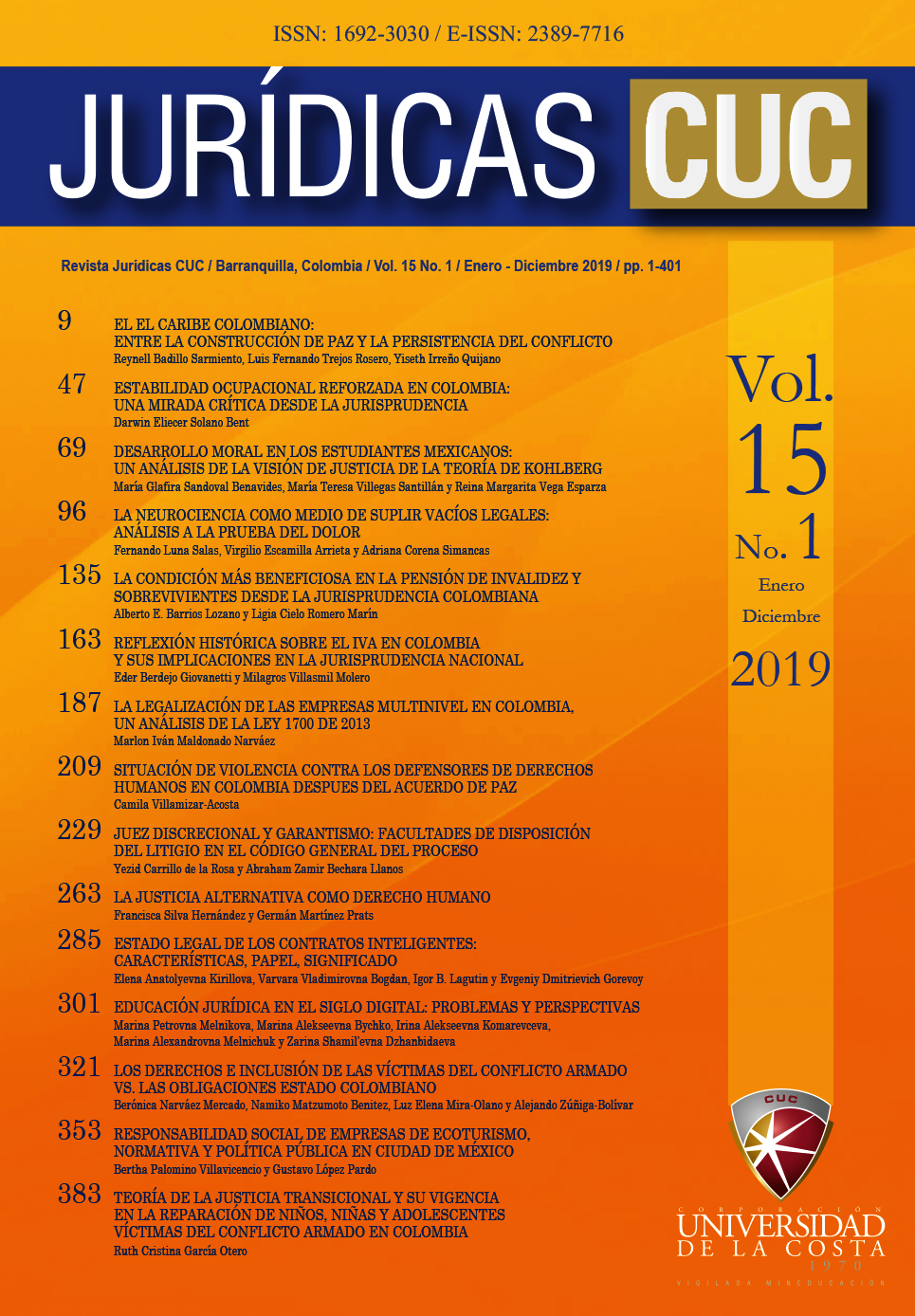Legal status of smart contracts: features, role, significance
DOI:
https://doi.org/10.17981/juridcuc.15.1.2019.11Keywords:
digital environment, intermediaries, legal relationship, legally relevant messages, smart contract, blockchain technologyAbstract
This article using critical analysis discusses the legal status of smart contracts, their features and characteristics, and the possibility of introducing this category into the legal field. The main goal of the study is to determine the legal status of smart contracts. The study concludes that a smart contract is a program code based on blockchain technology, which, by legal characteristics, is a legally significant message recorded in a language (artificial language) and sealed with an electronic digital signature of each of the parties (or certified with a special key). It is proved that the multilateral interactions implemented through smart contracts can reduce the costs of operations and control them, increase the speed of operations and reduce the risks associated with dishonest actions of the parties, minimize or completely exclude intermediaries from the transaction; therefore, legislation should provide for the possibility of using smart contracts along with existing contracts.
Downloads
References
Allam, Z. and Dhunny, Z. A. (2019). On big data, artificial intelligence and smart cities. Cities, 89(1), 80–91. https://doi.org/10.1016/j.cities.2019.01.032
Annalect. (October 12, 2017). Blockchain pulls marketing into uncharted territory. [Online]. Retrieved from: https://www.annalect.com/blockchain-pulls-marketing-into-uncharted-territory/
Ashraf, A. R., Thongpapanl, N. and Auh, S. (2014). The application of the technology acceptance model under different cultural contexts: The case of online shopping adoption. Journal of International Marketing, 22(3), 68–93. https://doi.org/10.1509/jim.14.0065
Barinova, A. and Zapechnikov, S. (2017). On the techniques and tools for privacy-preserving smart contracts. Bezopasnost informacionnyh tehnology, 24(2). 16–23 https://doi.org/10.26583/bit.2017.2.02
Bradbury, D. (2013). The problem with bitcoin. Computer Fraud & Security, (11), 5–8. https://doi.org/10.1016/S1361-3723(13)70101-5
Clack, C. D., Bakshi, V. A. and Braine, L. (2016). Smart Contract Templates: foundations, design landscape and research directions. Barclays Bank PLC. 1–15. Retrieved from: https://arxiv.org/pdf/1608.00771.pdf
Giancaspro, M. (2017). Is a ‘smart contract’ really a smart idea? Insights from a legal perspective. Computer Law & Security Review, 33(6), 825–835. https://arxiv.org10.1016/j.clsr.2017.05.007
Habibzadeh, H., Nussbaum, B. H., Anjomshoa, F., Kantarci, B. and Soyata, T. (2019). A survey on cybersecurity, data privacy, and policy issues in cyber-physical system deployments in smart cities. Sustainable Cities and Society, 50(1), 101660. https://doi.org/10.1016/j.scs.2019.101660
Hackett, R. (2017). Blockchain mania. Fortune, 178(3), 44–59.
Hazard J. and Hardjono, T. (2016). CommonAccord: Towards a Foundation for Smart Contracts in Future Blockchains. [W3C Position Paper]. Cambridge: MIT Media Lab. Retrieved from: https://www.w3.org/2016/04/blockchain-workshop/interest/hazard-hardjono.html
Hou, J. (2018). Destructive sharing economy: A passage from status to contract. Computer Law & Security Review (Forthcoming), 34(4), 965–976. Retrieved from: https://ssrn.com/abstract=3173588
Icertis. (2017). Smart contracts are transforming the way we do business – a Newsletter Featuring Gartner Research. [Online]. Retrieved from: https://www.icertis.com/resource/smart-contracts-are-transforming-the-way-we-do-business-featuring-gartner-research/
Kirillova, E. A., Bogdan V. V., Golovatskaya, M. V., Melnichenko, T. A. and Ognev, V. N. (2018). Legal Significance of Electronic Messages and Documents. Journal of Advanced Research in Law and Economics (JARLE), 9(3(33)), 997–1100. https://doi.org/10.14505//jarle.v9%203(33).25
Lauslahti, K., Mattila, J. and Seppälä, T. (2017). Smart Contracts – How will Blockchain Technology Affect Contractual Practices? [ETLA Reports, 68]. Helsinki: ETLA. Retrieved from: https://www.etla.fi/wp-content/uploads/ETLA-Raportit-Reports-68.pdf
Low, K. F. K. and Teo, E. (2018). Chapter 10: Legal Risks of Owning Cryptocurrencies. In D. L. K. Chuen and R. Deng, Handbook of Blockchain. Digital Finance, and Inclusion, Volume 1. Cryptocurrency, FinTech, InsurTech, and Regulation. (pp. 225–247). Singapore: Elsevier. https://doi.org/10.1016/B978-0-12-810441-5.00010-5
Luu, L., Chu, D-H., Olickel, H., Saxena, P. and Hobor, A. (2016). Making Smart Contracts Smarter. In ACM SIGSAC, Conference on Computer and Communications Security, CCS ‘16 (pp. 254–269). Vienna, Austria. http://dx.doi.org/10.1145/2976749.2978309
Pacini, C., Andrews, C. and Hillison, W. (2002). To agree or not to agree: Legal issues in online contracting. Business Horizons, 45(1), 43–52. http://dx.doi.org/10.1016/S0007-6813(02)80009-X
Rosic, A. (octubre 28, 2016). Smart contracts: The blockchain technology that will replace lawyers. [Blog]. Retrieved from: https://blockgeeks.com/guides/smart-contracts/
Sullivan, C. (2018). Digital identity – From emergent legal concept to new reality. Computer Law & Security Review, 34(4), 723–731.
Szabo, N. (1994). Smart Contracts. [Online]. Retrieved from: http://www.fon.hum.uva.nl/rob/Courses/InformationInSpeech/CDROM/Literature/LOTwinterschool2006/szabo.best.vwh.net/smart.contracts.html
Underwood, S. (2016). Blockchain beyond bitcoin. Communications of the ACM, 59(11), 15–17. http://dx.doi.org/10.1145/2994581
Ye, G. and Liang, C. (2016). Blockchain application and outlook in the banking industry. Financial Innovation, 2(1), 1–12. http://dx.doi.org/10.1186/s40854-016-0034-9
Yuanfeng, C. and Dan, Z. (2016). Fraud detections for online businesses: a perspective from blockchain technology. Financial Innovation, 2(1), 1–10. http://dx.doi.org/10.1186/s40854-016-0039-4
Published
How to Cite
Issue
Section
License
Copyright (c) 2019 JURIDICAS CUC

This work is licensed under a Creative Commons Attribution-NonCommercial-NoDerivatives 4.0 International License.
The authors are exclusively responsible for the published articles, which do not necessarily reflect the views of the editorial committee.
JURIDICAS CUC respects the moral rights of authors who have assigned the property rights on the published materials to the editorial committee. In turn, the authors declare that the work they submit has not been previously published.


 English
English
 Español (España)
Español (España)



